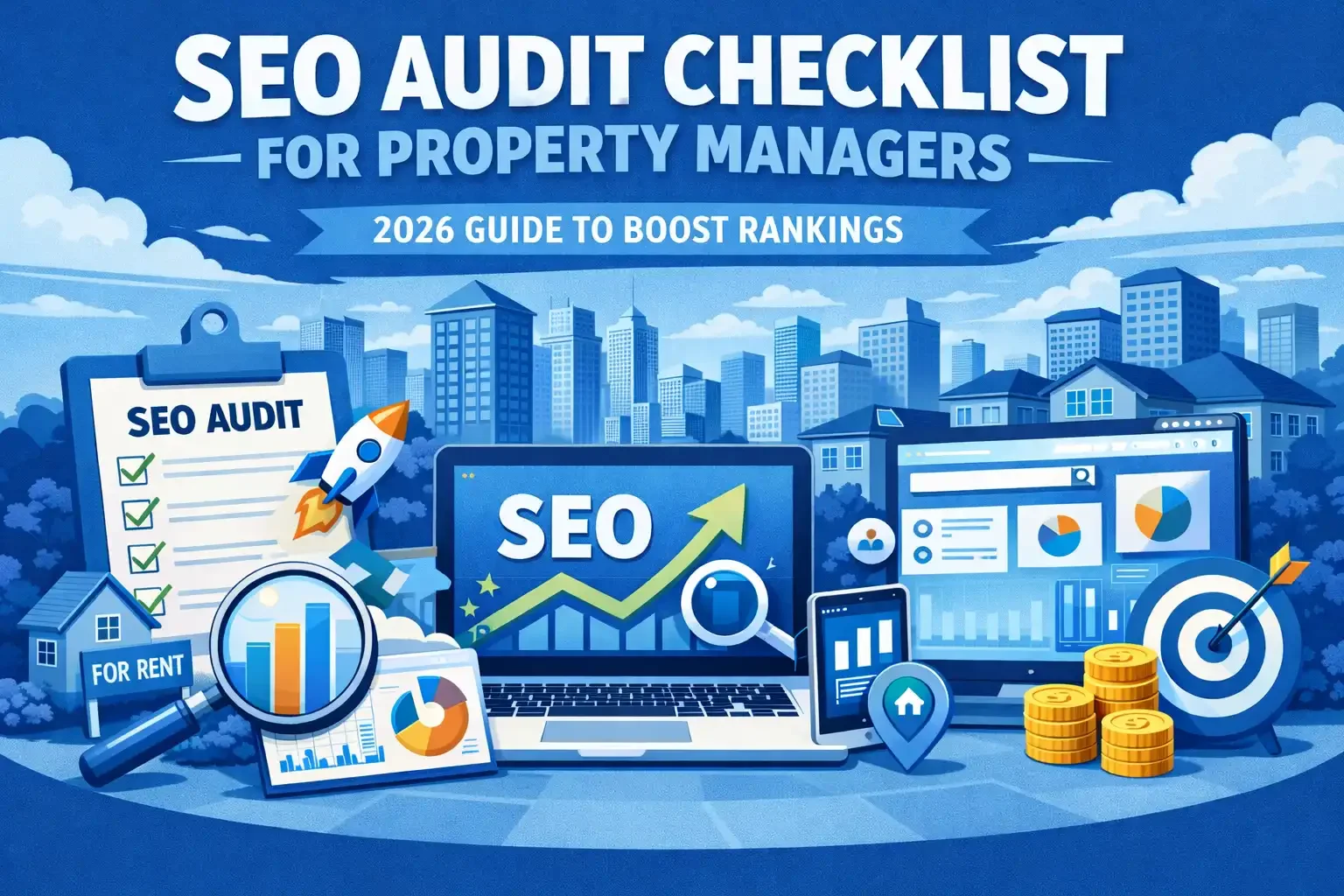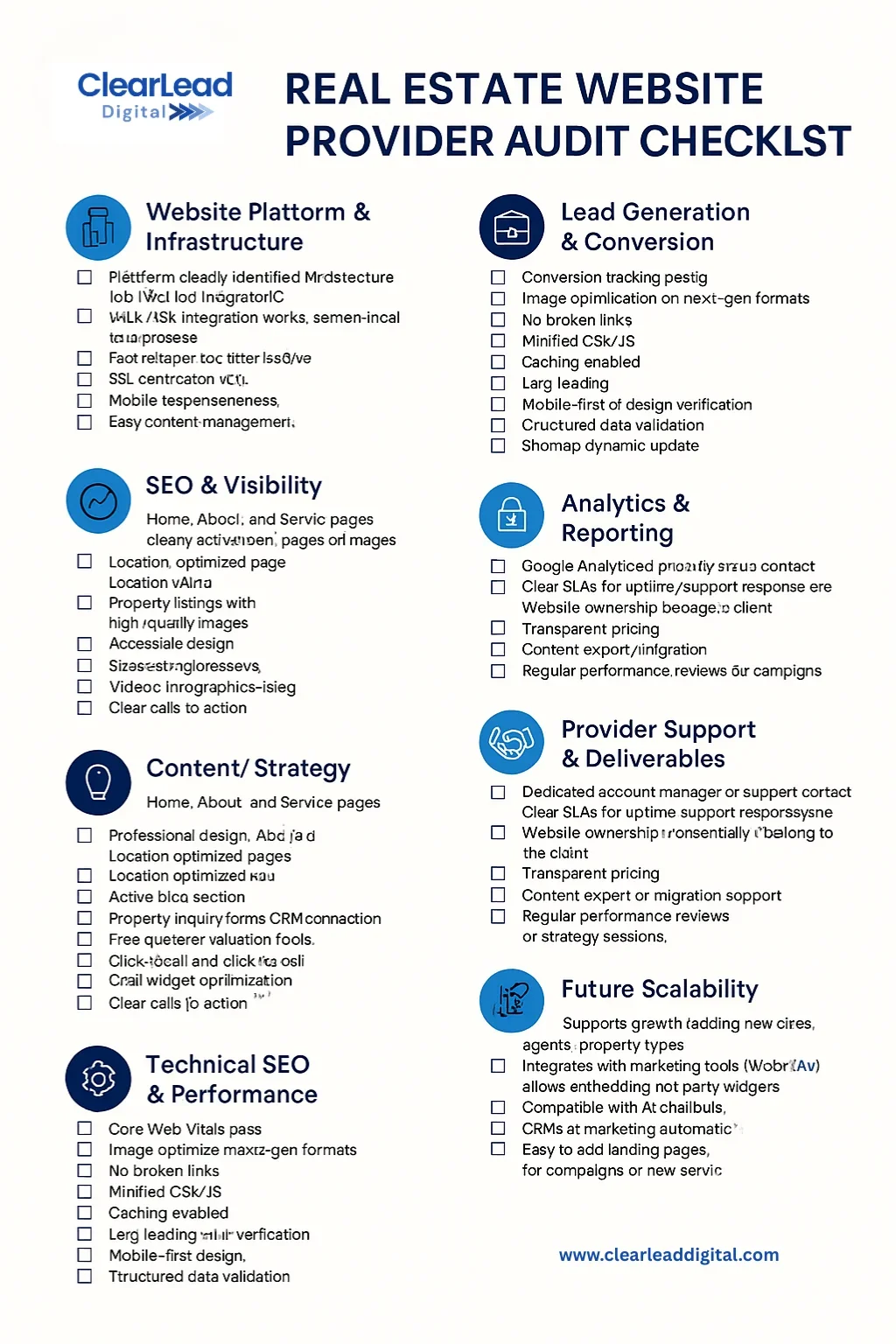SEO Audit Checklist For Property Managers: 2026 Guide to Boost Rankings
Last Updated: January 10, 2026
Does your website actually work for you—or is it just sitting online? A proper property management SEO audit reveals where your site is winning, where it’s losing, and how to unlock more owner leads in 2026. Are you looking for a checklist for auditing real estate website provider or property management website? This guide walks you through a step-by-step audit designed for property managers and real estate gents who want results.
Table of Contents
What is an SEO Audit?
An SEO audit is a full evaluation of your website’s performance in search engines. It checks technical health, keyword targeting, content quality, backlinks, and local visibility.
For property managers, an audit ensures that when owners search for “property management near me” or “best property managers in [city],” your company shows up before competitors.
Why Property Managers Need SEO Audits
In competitive rental markets, a poorly optimized site means lost leads. Regular audits help you:
Identify ranking issues before they cost you owners
Uncover missed keyword opportunities
Measure ROI of your marketing campaigns
Stay ahead of competing property management firms
Step 1: Technical SEO Check
Start with the foundation—your website’s technical health. Use tools like Google Search Console or SEMRush to check for:
Broken links (404 errors)
Slow load times (aim for under 2 seconds)
Mobile responsiveness across devices
Secure HTTPS connection
Core Web Vitals (LCP, CLS, FID)
Step 2: On-Page SEO Audit
Every page should be optimized for the keywords owners are searching for. Review:
Page titles with local + service keywords
Meta descriptions under 160 characters
H1 for primary heading, H2 for subsections
Alt text on all images
Internal links between blogs and service pages
Step 3: Local SEO Audit
Most owners search with location intent—so local SEO is crucial. Check:
Is your Google Business Profile complete and verified?
Is your NAP (Name, Address, Phone) consistent across directories?
Do you have recent, positive reviews?
Are you responding to reviews?
Do you have city-specific landing pages (e.g., “Orlando Property Management SEO”)?
Step 4: Content & Keywords
Great SEO depends on great content. Audit your site to ensure you’re targeting:
Primary keywords: “property management SEO,” “SEO for property managers”
Secondary keywords: “SEO checklist for property managers,” “local SEO for property managers”
Owner-focused blogs: “How to Choose a Property Management Company,” “PPC vs SEO for Property Managers”
Content updates at least quarterly
Step 5: Backlinks & Authority
Search engines trust sites that others link to. Ask:
Do we have backlinks from industry sites (NARPM®, BiggerPockets, local REIAs)?
Are competitors building links we’re missing?
Can we guest post, join podcasts, or publish data studies?
Can we replace broken backlinks with our resources?
Step 6: Conversion Optimization
SEO traffic means nothing without leads. Review your conversion elements:
Do pages have strong CTAs like “Request a Free Audit”?
Is your contact form short (3–4 fields max)?
Are case studies and testimonials above the fold?
Do you offer downloadable resources (like this checklist)?
Step 7: Competitive SEO Gap Analysis (Often Missed)
A complete SEO audit for property managers should not stop at your own website. One of the most valuable (and most overlooked) steps is analyzing how you compare to competing firms in your market.
A competitive SEO gap analysis answers one critical question:
Why are competitors outranking you—and what can you realistically take from them?
Review the following areas:
Keyword gaps: Identify keywords competitors rank for that you do not, especially high-intent terms like “property management company in [city]” or “best property manager near me.”
Content depth: Compare blog length, structure, and topical coverage. Many property management sites lose rankings simply because their content is thinner or outdated.
Local dominance: Review how often competitors appear in the Google Map Pack, how many reviews they have, and how frequently they post updates.
Backlink quality: Look at the sources of competitor backlinks—not just the quantity. Local news, chambers, real estate blogs, and associations matter more than generic directories.
This step transforms your SEO audit from a diagnostic tool into a market capture strategy.
Step 8: Tracking, Reporting, and Ongoing Optimization
An SEO audit is not a one-time event—it is the baseline for continuous improvement. Without tracking, even the best optimization efforts lose momentum.
Your audit should define clear benchmarks for:
Keyword rankings (local + organic)
Organic traffic growth
Conversion rates from organic traffic
Cost per owner lead
Google Business Profile visibility
Engagement metrics (bounce rate, time on page)
For property managers, the ultimate metric is not traffic—it is doors added. Your SEO audit should tie rankings and traffic directly to business outcomes.
At ClearLead Digital, audits are designed to feed into an ongoing optimization roadmap, ensuring that fixes are implemented, measured, and refined—not ignored after delivery.
Step 9: AI Search & Generative SEO Readiness (2025+)
Search behavior is changing rapidly. Property management SEO audits in 2025 must account for AI-driven search results, including Google’s AI Overviews and generative answers.
Your audit should evaluate:
Whether content is written clearly enough to be cited by AI summaries
Use of structured headings and FAQs
Schema markup (FAQ, LocalBusiness, Review)
Clear definitions and concise explanations
Author credibility and topical authority signals
Websites that fail to adapt to AI-driven visibility risk losing impressions—even if rankings remain stable.
Frequently Asked Questions
-
At least twice a year—or quarterly in competitive markets.
-
Google Search Console, SEMrush, Ahrefs, and Screaming Frog are excellent starting points.
-
You can run a basic audit yourself, but a professional agency identifies deeper issues and creates a roadmap for growth.
-
Technical fixes can often be completed within weeks, while content, authority, and local SEO improvements typically take 3–6 months to show measurable gains.
-
A property management SEO audit focuses on local intent, owner-focused keywords, Google Maps visibility, compliance considerations, and conversion paths specific to real estate investors and landlords.
-
Basic audits are possible internally, but most property managers benefit from a professional audit that includes competitive analysis, advanced technical review, and a prioritized action plan.
-
Create an implementation roadmap, assign ownership for fixes, and track results monthly. An audit without execution will not improve rankings or lead volume.
Final Thoughts
A property management SEO audit is the first step to increasing visibility, generating more owner leads, and outranking competitors with tools like Semrush.
At ClearLead Digital, we’ve built an SEO system designed specifically for property managers. Our transparent audits pinpoint exactly where your website is falling short—and how to fix it.


